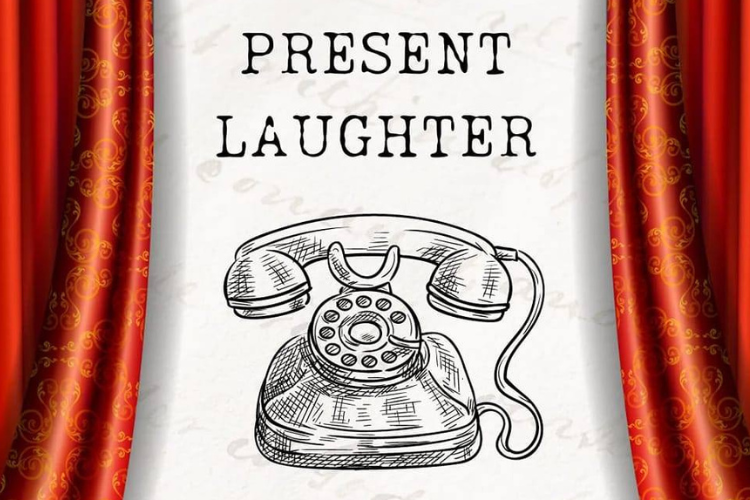Theatre Review: Present Laughter
Written by Noël Coward
Directed by Louise Anderbjörk and Ellie Mckay
Produced by Paige Docherty
Reviewed by Kailee Parsons
Noël Coward’s popular comedy Present Laughter, which follows actor Garry Essendine on the cusp of a mid-life crisis, opened last night in the Byre Theatre under the direction of Louise Anderbjörk and Ellie McKay.
Garry Essendine’s (Marcus Judd) phone never stops ringing. The same is true of his doorbell, and if the ever-growing stack of envelopes permanently in the hands of Garry’s long-suffering secretary, Monica (Margot Pue), is any indication, Garry is in high demand. His West End career has brought him immense popularity, and although he has recently—and regrettably—turned forty, beautiful young women are constantly arriving at his swanky London home late at night, having forgotten their latchkeys.
One such woman, Daphne Stillington (Rebecca Black), opens the show via a chat on the rotary phone, the centrepiece prop, bringing the audience up to speed. Her nervous energy and sickeningly sweet murmurs into the receiver gain the first laugh of the night, and from there, the energy rarely flags.
As soon as Garry awakes and removes Daphne from the house, Liz Essendine, legally still his wife although she left him years ago (played by India Kolb with a calculated immovability which is frankly inspirational), informs Garry of a problem within their social circle. She suspects his manager, Morris Dixon (Dylan Swain), of having an affair with the wife of his producer, Henry Lyppiatt (Molly Luckhurst). While this storyline provides the central conflict of Present Laughter, many more irritations await Garry before the final curtain.
The most formidable of these is the understated but alluring Joanna (Lexie Dykes), who is carpe diem incarnate. The most entertaining, however, takes the form of a show-stealing performance by Sam Mason as Roland Maule, an aspiring young playwright obsessed with Garry and understandably banned from the house. Hannah Savage gives another stand-out performance as Miss Erikson, who won some of the biggest laughs of the night and is so delightful, even with so few appearances, that you wish she had a sequel of her own.
It is astounding how well each member of the cast is equipped to tackle the high-octane comedy of Present Laughter. Nearly every actor performs with a voice or accent not their own, and even those with comparatively less to do must rely on physical comedy and perfect comedic timing to ensure the jokes land. Sam Klein particularly excels at comedic timing as Fred the valet, Fiona Lock demonstrates an incredible accent and delivers one of the funniest lines of the night, and Dylan Swain and Molly Luckhurst are perfectly believable as incensed colleagues caught in the crossfire of bad decisions—both their own and those of their friends.
Of course, the play relies heavily on strong performances from its central cast, who are tasked with delivering a vast number of lines at a frenetic pace without losing control of the plot. Marcus Judd, a talented dramatic actor, shines here in a comedic role, using movement to his benefit as he struts across the stage, recites poetry, plays the piano, flicks his unkempt hair, and throws tantrums—he can’t stop himself from performing. In return, Margot Pue keeps Garry grounded, her performance extending beyond annoyance to begrudging affection. Judd and Pue also succeed in the show’s quieter moments, during which Garry examines which of his many colleagues, fans, and lovers, if any, are actually his friends.
The set is impressively lavish and believable as Garry Essendine’s lush London home. Thankfully, it also remains in place for most of the night, rendering clunky set changes obsolete. The sound and lighting choices are also simple but effective—a spotlight used for comedic effect relies on the impeccable timing of technicians Willa Meloth and Annalise Roberts, as do the constantly ringing phone and doorbell.
Louise Anderbjörk and Ellie McKay, who co-directed the performance, along with producer Paige Docherty and the rest of the cast and crew, should be lauded for their incredible achievement.

